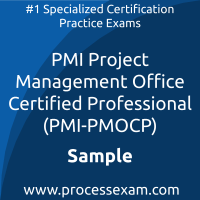 You have to pass the PMI-PMOCP exam to receive the certification from PMI. To increase the effectiveness of your study and make you familiar with the actual exam pattern, we have prepared this PMI Project Management Office Certified Professional sample questions. Our Sample PMI Project Management Office Certified Professional Practice Exam will give you more insight about both the type and the difficulty level of the questions on the PMI Project Management Office Certified Professional exam.
You have to pass the PMI-PMOCP exam to receive the certification from PMI. To increase the effectiveness of your study and make you familiar with the actual exam pattern, we have prepared this PMI Project Management Office Certified Professional sample questions. Our Sample PMI Project Management Office Certified Professional Practice Exam will give you more insight about both the type and the difficulty level of the questions on the PMI Project Management Office Certified Professional exam.
However, we are strongly recommending practice with our Premium PMI Project Management Office Certified Professional (PMI-PMOCP) Practice Exam to achieve the best score in your actual PMI-PMOCP Exam. The premium practice exam questions are more comprehensive, exam oriented, scenario-based and exact match of PMI Project Management Office Certified Professional exam questions.
PMI Project Management Office Certified Professional Sample Questions:
01. When shaping an OPM-aligned culture, which element is most critical to long-term success?
a) Monthly surveys to measure employee satisfaction
b) Codified project management procedures
c) A clearly defined vision and set of values
d) Project manager incentives for on-time delivery
02. What are two advantages of categorizing PMO customers by role and function?
a) Allows more targeted communication
b) Facilitates early billing conversations
c) Supports tailored service offerings
d) Reduces onboarding paperwork
03. How can a PMO most effectively use feedback to improve its services?
a) By publicly naming teams that provide negative feedback
b) By using feedback to inform service adjustments and enhancements
c) By archiving it in project folders for audit purposes
d) By rewarding only senior stakeholders for participation
04. Which of the following is most critical when implementing targeted training programs for different OPM competency levels?
a) Ensuring cost-efficiency of training vendors
b) Incorporating standardized certification pathways
c) Matching content to skill gaps identified during assessment
d) Using gamification to boost engagement
05. How can leadership most effectively drive a cultural shift toward Organizational Project Management (OPM)?
a) By modeling OPM behaviors and visibly supporting initiatives
b) By authorizing procurement of a new PPM tool
c) By delegating cultural change to the HR department
d) By organizing monthly team-building activities
06. In the context of PMO strategy, what is the purpose of performance metrics?
a) Assign tasks to junior staff
b) Measure strategic contribution and service effectiveness
c) Justify hiring decisions
d) Ensure payroll compliance
07. What are two common obstacles to implementing a new OPM competency model?
a) Stakeholder overload
b) Resistance to change
c) Lack of baseline assessments
d) Excessive project ROI focus
08. A performance ________ process ensures actions are taken to resolve service delivery gaps.
a) Improvement
b) Staffing
c) Modeling
d) Contracting
09. Why should OPM competencies be embedded into performance evaluations?
a) To comply with ISO quality standards
b) To facilitate automated HR systems integration
c) To replace outdated technical skills assessment
d) To promote accountability and reinforce desired behaviors
10. A customer ________ loop allows PMOs to gather input, respond, and refine service offerings.
a) Innovation
b) Feedback
c) Referral
d) Audit
Answers:
Question: 01
Answer: c |
Question: 02
Answer: a, c |
Question: 03
Answer: b |
Question: 04
Answer: c |
Question: 05
Answer: a |
Question: 06
Answer: b |
Question: 07
Answer: b, c |
Question: 08
Answer: a |
Question: 09
Answer: d |
Question: 10
Answer: b |
If you find any errors or typos in PMI Project Management Office Certified Professional (PMI-PMOCP) sample question-answers or online PMI Project Management Office Certified Professional practice exam, please report them to us on feedback@processexam.com
 You have to pass the PMI-PMOCP exam to receive the certification from PMI. To increase the effectiveness of your study and make you familiar with the actual exam pattern, we have prepared this PMI Project Management Office Certified Professional sample questions. Our Sample PMI Project Management Office Certified Professional Practice Exam will give you more insight about both the type and the difficulty level of the questions on the PMI Project Management Office Certified Professional exam.
You have to pass the PMI-PMOCP exam to receive the certification from PMI. To increase the effectiveness of your study and make you familiar with the actual exam pattern, we have prepared this PMI Project Management Office Certified Professional sample questions. Our Sample PMI Project Management Office Certified Professional Practice Exam will give you more insight about both the type and the difficulty level of the questions on the PMI Project Management Office Certified Professional exam.